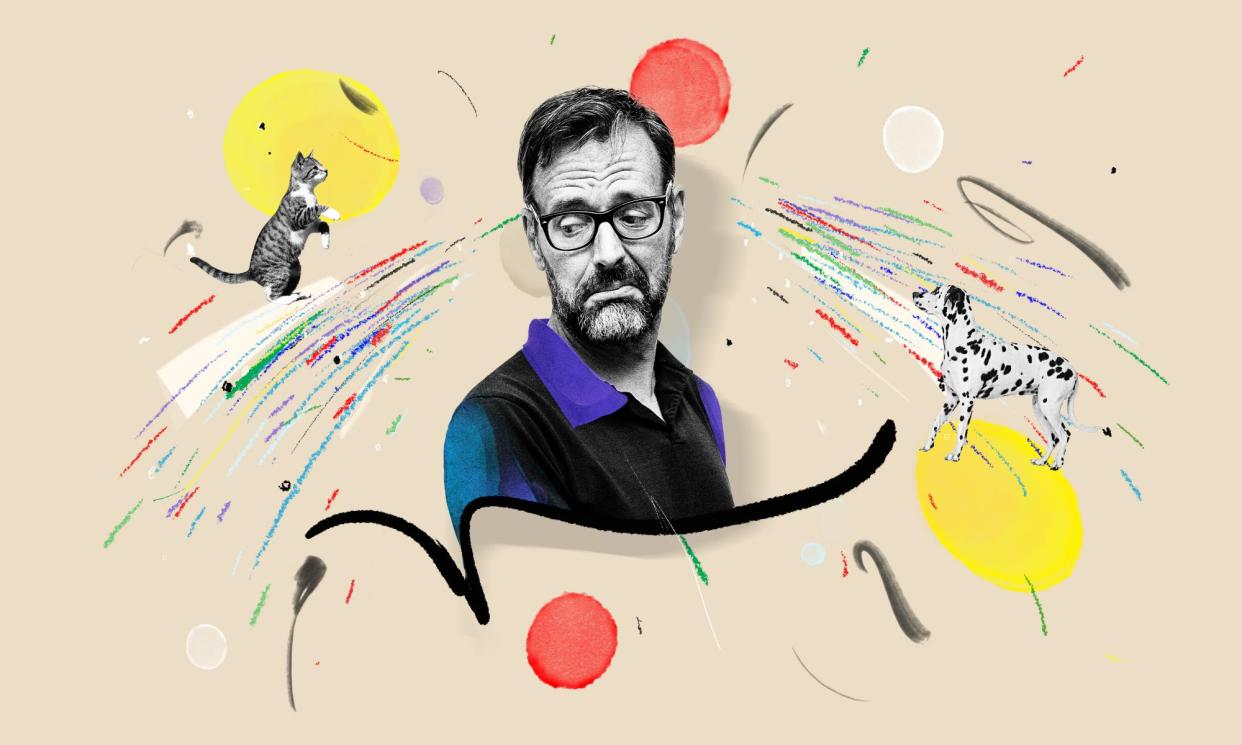Tim Dowling: all the new puppy wants to do is eat and pee – anytime, anywhere

Thanks to a strict system of positive reinforcement, the little dog has learned that it’s good to pee outside. Unfortunately it still has no idea that it’s bad to pee inside. It could be that the distinction between inside and outside has been made insufficiently clear. Or it could be that our negative reinforcement is simply ineffective.
“This is, frankly, an outrage,” I say to the little dog, after finding yet another puddle of piss in the sitting room. The dog, who I’ve located in the kitchen, has no idea what I’m talking about. It sits up, tiny tail thumping against the floor, waiting to be rewarded for something it has inadvertently done right.
“The garden is literally right behind you,” I say, pointing. “The door is wide open.”
The dog stares at me, ears up, thinking: is he talking about food?
Puppies in general – and this one in particular – are highly incentivised by food, but they are not disincentivised by no food. You can easily teach a puppy to sit in exchange for a single dog treat, but you can’t teach it to stop sitting because there are no more dog treats. And once the topic of food has been introduced, it’s very difficult to change the subject; school is basically over.
The obsession is all-consuming. I’ve had to oil the hinges on all the kitchen cupboards, because the squeak of them opening summons the puppy from anywhere in the house. Mealtimes are brief and frenzied, and end with a little dog staring up at you with an expression that says: let’s do that again.
‘Where did you get that lettuce?’ I say. I look down the lawn, where the tortoise is staring at me balefully. In truth, he has no other expression
Mid-morning, after discovering a dark patch on the stair carpet, I find the puppy lying in the garden gnawing a distressed head of lettuce.
“Where did you get that?” I say. I look further down the lawn, where the tortoise is staring at me balefully. In truth, he has no other expression.
“Did you take that from him?” I say.
The dog tears off a lettuce leaf and flicks it into the air.
“Anyway, I came to discuss another matter,” I say. “The stairs.”
The dog stands up and pees outside.
“Yes, well done,” I say. “Good girl, etcetera. But this other …”
The dog runs into the kitchen and sits down next to the drawer where the dog treats are kept.
“Fine,” I say, following. “But peeing outside is only half the story. There is also not peeing inside.”
The dog looks at the drawer, then at me, then at the drawer.
“Fine,” I say, opening the drawer and extracting a treat. “Although technically what happened on the stairs should cancel this out.”
I lower the treat. The dog jumps up, snatches it, and then sits back down.
“What, you want another one?” I say. “For sitting?” The dog stares.
“What is this?” my wife yells, from halfway down the stairs.
“But I didn’t tell you to sit,” I say. “So it doesn’t count.”
“Jean!” my wife shouts. “Come here!” The dog doesn’t move.
“Fine,” I say. “If anyone asks, this never happened.”
On the advice of the oldest one’s girlfriend, my wife buys the puppy a special dog bowl with deep ridges at the bottom, like a maze, to make it harder to get at the food, thereby enriching the dog’s eating experience. The slowdown bowl certainly works – mealtime now lasts 10 minutes instead of eight seconds – but from a human perspective it’s hard to determine which is more disturbing – unseemly haste or unstinting determination.
“If you died, how long do you think this dog would wait before eating you?” I say, watching it worry the bowl. “Twenty minutes?”
“Fifteen,” my wife says.
“I’m not even sure you’d have to be all the way dead,” I say.
The next morning my wife takes the puppy back to the vet for its second lot of injections. Later I will be told that the dog gained a kilo in the two weeks between appointments. But for now I’m enjoying a rare moment of tranquillity. I am sitting in my office shed, looking out into the garden. The cat is asleep in a chair beside me. There is cat food in a bowl on the floor, unfinished and yet unmolested. The tortoise is on the grass, eating a cucumber end, also unmolested. It’s warm, but there is a note of autumn in the still air.
A squirrel comes over the garden wall with a nut in its mouth. It zigzags across the lawn looking for a place to bury its prize, finally stopping to dig a hole in the middle of the lawn.
“I wouldn’t put it there,” I say. “It won’t last the afternoon.”


